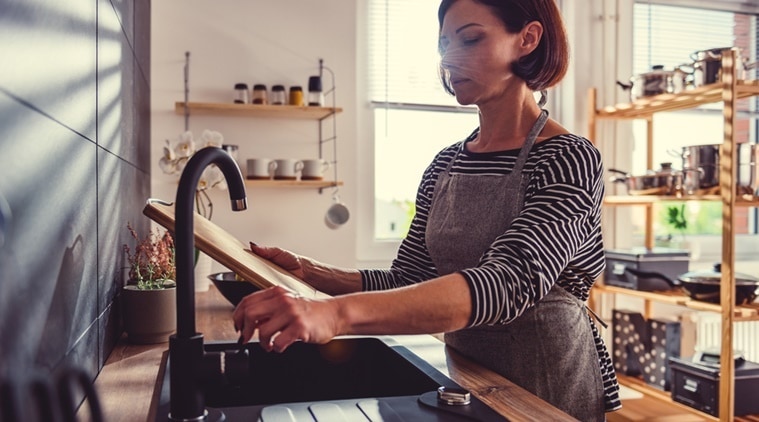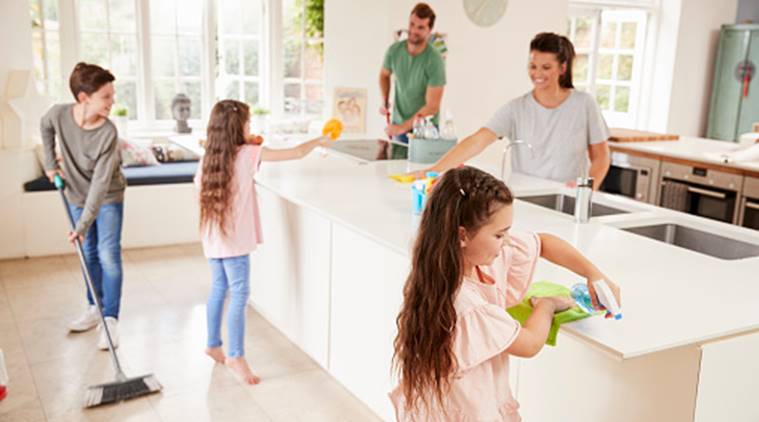 Wash and dry your dishes immediately after use. (Source: File Photo)
Wash and dry your dishes immediately after use. (Source: File Photo)
You may love spending time in the kitchen and experiment with your culinary skills. But cleaning up after all the cooking and eating is not something everyone enjoys. However, it is extremely essential to keep your kitchen clean, and it is not only about doing the dishes. If you have been having a hard time managing both the cooking and the cleaning bit, here is some help from Pankaj Poddar, co-founder, Hipcouch.
Clear your counter
This seems obvious, but you may be surprised to see how our counter slowly gets cluttered over time with appliances, jars, bottles and other items. You could argue that you like your stuff displayed and within easy reach, but it’s a hundred times easier to wipe down when you don’t have to move everything out of the way first. Additionally, it gives you more space for prep work and mis-en-place when you’re trying to get your meals ready. Yes, it will fit in your cupboards. If it really (really) doesn’t, at least lob it all into a single tray so when you have to move stuff out of the way, you’re moving all of it at once.
Start with cleaning first
Remember how you couldn’t get yourself to sit down to study for an exam without first cleaning your desk, setting it up, getting the right stationery? Contradictory to what your mom believed, it wasn’t just a way to waste time or an excuse to delay hitting the books. Psychologically, it’s less overwhelming to start with a clean slate. Don’t start in a disaster zone, even if it may turn into one later. Make sure the sink, countertop and floor are clean when you begin, and that you have enough space for the gastronomic experiments to follow.
Watch your food prep
Use separate chopping boards for uncooked foods like raw meat and salad leaves. Wash and dry your hands after handling these kinds of foods, and clean surfaces immediately after use. Regular soap and water is fine; just ensure that your cleaning cloth is germ-free, and do not forget to dry surfaces (including chopping boards) thoroughly after cleaning. Germs love damp surfaces, and enough water is all they need to multiply.
 Make sure to put away things that are not needed in the kitchen space. (Source: Getty Images)
Make sure to put away things that are not needed in the kitchen space. (Source: Getty Images)
Multitask
While you’re waiting for your dal to simmer, start putting away the stuff you’re done with — appliances, utensils, ingredients — and wiping down surfaces as you go, so the mess doesn’t pile up. The more you are left to clean after, the higher your chances of leaving it for later. If you’re opening packages, bin them on the go. Cutting vegetables? Put the unusable leftovers in the recycling bin. Spilt something? Don’t let it sit and stink up your space/make it sticky. Wipe it down as soon as you see it; use a kitchen cloth so you can rinse and reuse, as opposed to piling up endless paper towels.
Stockpile the sanitiser, not the dishes
Wash and dry your dishes immediately after use. When you’re done with the dishes, make sure you also manually remove all the little bits of food that have spiralled into the sink. Finally, wash the sponges and brushes you used to clean up with detergent and warm water after each use. For best results, follow a no-overnight-dishes rule so you always wake up to a fresh kitchen that you’re happy to walk into.
Have a dedicated day for various spaces
If you don’t have the time to do a deep clean every day, schedule a different part of the kitchen for different days of the week. Stoves, chimneys, exhaust fans, the window/wall above the stove, the inside of a microwave, behind the fridge and light fixtures. These are all easy-to-forget grime hotspots that gather dust and oil spatters. Give the inside of your fridge a weekly sweep as well, and keep an eye on the expiration dates on everything that’s in there. Tackle these spaces one at a time through the week, and you’ll avoid unpleasant surprises later.